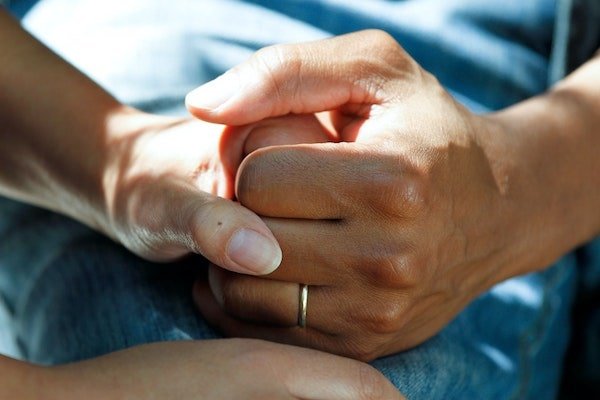Counseling for Cancer Patients, Survivors, and Caregivers
Has Cancer Caused A Life-Changing Impact On You Or Your Loved One?
Have you or a loved one received a cancer diagnosis that’s left you feeling like the rug has been pulled out from underneath your feet?
Do you constantly dread cancer treatment or worry about its potential side effects?
Are you so afraid that treatment won’t be effective that you look toward the future with a sense of fear and hopelessness that won’t relent?
Perhaps you are in remission and worry that cancer will return, and become anxious any time you have to go in for a scan. Even simple blood work tests can lead you to have a panic attack. And the waiting period for the test results to come back can be excruciating both during treatment and afterward.
Cancer Affects Patients, Caregivers, And Family Members in Different Ways
Any time someone receives a cancer diagnosis, it can be a life-changing event for everyone involved. It often comes without warning and impacts all areas of a patient and their loved ones’ lives.
For instance, you may be caring for a loved one who is going through cancer treatment or remission. As a parent, a child, or spouse, you have likely supported them without hesitation or question. However, no matter how much you want to be there for them, you likely never anticipated the emotional and physical toll it would take on you.
As a caregiver, you might be experiencing extreme anxiety watching your loved one go through treatment. Or maybe you feel guilty when you do anything for yourself—as if you are abandoning them somehow.
Regardless of how you have been affected by cancer, processing the events in real time will help you feel more grounded during your journey which will empower you to make more informed and conscious decisions for yourself and those that you love.
Whether you are a cancer patient, survivor, or caregiver, counseling can offer you compassionate support for navigating these difficult times so you can finally find some relief.
The Toll Of Cancer Is Hard For Everyone
In our society, illnesses are usually not discussed openly or in detail. Often, cancer patients are given a list of medications and recommendations on how to alleviate the physical impact of cancer treatments. But, a minimal amount of time is spent discussing the psychological toll that the cancer diagnosis and treatment has on an individual and their family.
When the topic of cancer is discussed, it is often scary and not hopeful. With new advances to cancer treatments, the survival rate for cancer is getting higher. While this is exciting news, unfortunately, the psychological effects of a cancer diagnosis don’t end when the treatment does. As a result of cancer treatments and the nature of having to make huge decisions when they are diagnosed, many people develop mild to severe forms of depression, anxiety, or PTSD.
While some of these issues may begin during treatment, most people do not begin to truly experience these mental health concerns until they are done with treatments or are in remission. Caregivers, cancer survivors, and patients need support when going through treatment and afterwards.
Naturally, going through cancer or treatment may dredge up unwanted feelings – such as fear, doubt, panic, regret, and more. From the time the words, “You have cancer,” were uttered, the emotions and thoughts ran uncontrolled through your mind. “Is this my fault? Why is this happening to me? What is there after this? How will I tell my family?”
It is human nature to fear the unknown or to have existential questions about life after receiving a diagnosis. Recognizing one’s mortality and becoming aware of life’s fragile nature can be a terrifying, life-altering experience for anyone.
Caregivers Need Support Also
It is hard to watch someone you love fight cancer. As you stand beside them on this journey, you likely feel a great deal of empathy and unwavering support. Although you would do anything to help support them through this time, it’s not uncommon for caregivers to experience anxiety and debilitating fears of their own.
Being a caregiver means remaining as positive as possible. However, it is hard to feel like you need to bottle your emotions inside. With so much going on, it can be easy to slip into anxious, depressed, or self-defeating thoughts—but there is hope for the future. And there is compassionate help available.
Counseling For Cancer Patients, Caregivers, and Survivors Gives You The Support You Need
When you are on a journey with cancer, you may feel the need to put on a brave face for those around you—to be strong and positive at all times. When this happens, you may bottle up emotions rather than acknowledge them.
However, therapy is an opportunity to unmask how you are feeling. It’s a place for you to freely express your thoughts, emotions, and anxieties over what is happening in your life. Whether you are coming to counseling for support as a cancer survivor, caregiver, or patient, you can rest better when you release what you have kept inside.
My Approach To Therapy
I use a multi-layered, eclectic approach to therapy. People are not a “one size fits all” and neither is the way I view treatment approaches. I like to integrate a solution-focused, existential, acceptance and commitment and CBT approach to therapy. I do this to help identify core beliefs, underlying fears and anxieties, while implementing realistic interventions in order to create attainable goals with my clients. I strive to create the safest space in therapy for clients to discuss whatever comes to their minds and sits heavy on their hearts.
In my counseling sessions for cancer patients, survivors, and caregivers, I use a few different therapeutic methods. We will explore the human experience, including the idea of death, our freedom, and our choices. I’ll show you mindfulness techniques to help keep you grounded in the present moment, which will help you self-soothe and regulate any fear or anxiety you may experience. And in the process, you can learn how to take responsibility for your own life and what the meaning of life is for you.
I have been working with the cancer community since 2015. As someone who was directly impacted by cancer, providing support for patients, survivors, and caregivers through counseling is my passion and lifelong commitment.
I Know First Hand The Toll That Cancer Takes
I understand the mental health struggles that come from fighting cancer. As a cancer survivor myself, I understand the psychological impact that a cancer diagnosis has and how important counseling is for support.
Through counseling, I can help you gain a new perspective and feel more empowered. Together, I can help you overcome the anxieties that come from going through cancer, surviving it, or being a caregiver.
You May Still Have Questions About Counseling For Cancer Patients, Survivors, and Caregivers
I can’t sleep at night because all I think about is being sick.
Many people facing a cancer diagnosis commonly experience sleeplessness. While over-the-counter medications for insomnia may help, they don’t always provide full relief. When combined with therapy, you will find that you experience less ruminating and obsessive thoughts, which contribute to anxiety and restlessness.
How do I talk to my children about my cancer diagnosis?
If you have children, you may wonder how you can talk to them about cancer. You might even be tempted to pretend that everything is ok. However, family therapy for cancer patients can also help young children process their emotions when there is a cancer diagnosis. In an age-appropriate manner, we will allow children to talk and ask questions about what is happening. At the same time, it allows you the opportunity to learn how your children feel and learn the necessary communication skills to allow them to feel safe and understood.
I’m a cancer survivor, but I feel more afraid now than when I was in treatment. Is this normal?
It is. After treatment, you may feel like you are on your own to pick up the millions of tiny pieces that were once your life. Symptoms of anxiety, fear, or hopelessness are a few emotions that can linger after going through something as traumatic as cancer. Talking through your emotions and thoughts in a safe space helps you release what you have been holding in.
You Can Learn To Live A More Fulfilling Life In The Face Of Cancer
No matter where you are on this journey, there is still hope. Cancer may impact your life, but it doesn’t have to define you. If you are still hesitant, I would like to invite you to schedule a free 20-minute phone consultation to answer any questions you may have. I am available for you to call or contact through my website and will get back to you within 24 hours.




